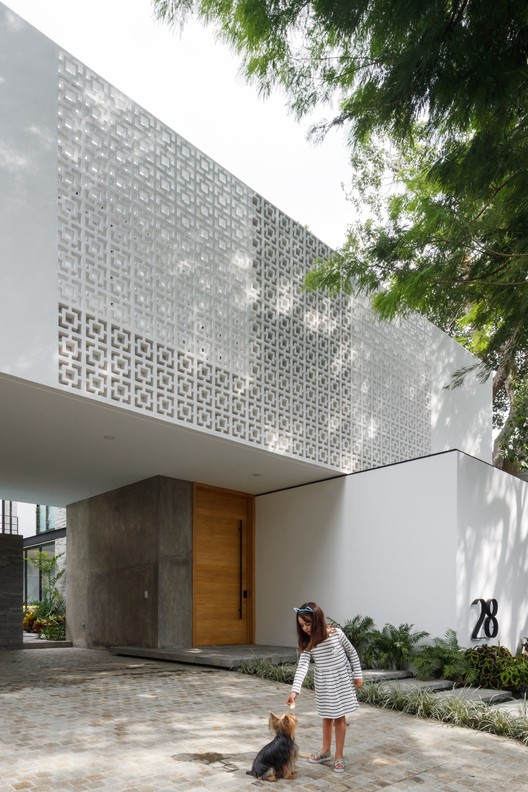Retrospect Vineyards House Swatt Miers Architects
2015-08-19 17:00
© Russell Abraham
罗素·亚伯拉罕


架构师提供的文本描述。回顾俄罗斯河谷20英亩的葡萄园,15年来一直在生产黑比诺葡萄并出售给附近的葡萄园。然而,当新业主在2010年买下该房产时,他们知道他们希望更多地参与酿酒过程。其结果是建造了一个现代化的住宅,既可以作为家庭的静养地,也可以作为工作的葡萄园,既尊重居民的隐私,又不妨碍土地的功能。
Text description provided by the architects. Retrospect Vineyards, a 20-acre plot in the Russian River Valley, has been producing pinot noir grapes and selling them to nearby wineries for fifteen years. However, when the new owners bought the property in 2010 they knew they wanted to have a greater involvement in the winemaking process. The result was a modern home designed to function as both a family retreat and a working vineyard, respecting the privacy of the residents without hampering the functionality of the land.
© Russell Abraham
罗素·亚伯拉罕


葡萄园的设备和材料都存放在毗邻的谷仓里,与主房子在同一个温莎石里,一个大停机坪可以容纳载运新收成的卡车。第二条车道将商业活动与住宅分隔开来,但进出谷仓的车辆在主房子前面经过。面对着一边的商业运作,另一边是对周围葡萄园的广阔视野,这栋建筑的设计在狭窄的‘T’形平面的两边都有两种不同的外观处理:在北面,一个相对不透明的入口庭院提供隐私,同时通过一个精致的垂直木屏风允许阳光照射。而南面则不采用实心墙,而是采用双层玻璃。
Equipment and materials for the vineyard are stored in the adjacent barn, clad in the same Windsor Stone as the main house, and a large parking pad accommodates trucks picking up new harvests. A second driveway separates the commercial activity from the residential, but traffic to and from the barn passes in front of the main house. Faced with these business operations on one side and an expansive view of the surrounding vineyards on the other, the building was designed with two distinct façade treatments on either side of a narrow, ‘T’-shaped plan: to the north, a relatively opaque entry court provides privacy while admitting daylight through a delicate vertical wood screen, while the south façade eschews solid walls in favor of double-height glazing.
© Russell Abraham
罗素·亚伯拉罕


这座房子的设计是为了适应家庭生活,一楼有公共或共用的区域,上面有卧室。主卧室与儿童房之间有一座桥,横跨双层大房间,占下层的大多数。在下面,厨房和办公室都通向游泳池露台,在这间大房间里,宽21英尺的全高滑动玻璃门无缝地将居住空间延伸到圣特罗佩斯石灰岩泳池露台上。
The plan of the house was designed to respond to family living, with public or shared areas on the ground floor and bedrooms above. The master bedroom is separated from the children’s rooms by a bridge spanning the double-height great room that takes up the majority of the lower level. Below, the kitchen and office both open up to the pool terrace, and in the great room a twenty-one-foot wide span of full-height sliding glass doors seamlessly extends the living space out onto the St. Tropez limestone pool terrace.
© Marion Brenner
c.Marion Brenne


独立的客房套房,设想为一个玻璃盒突出在露台边缘,功能作为一个单独的建筑,同时保持连接到主房子之间的低屋顶跨越结构。客房与主楼隔开,同时可以畅通无阻地欣赏270度景观,中间空间被用作室外厨房和休息室,两侧都有露台和葡萄园景观。
The detached guest suite, envisioned as a glass box projecting beyond the terrace edge, functions as a separate building while remaining connected to the main house by the low roof that spans between the structures. The guest house is screened from the main building while enjoying completely unobstructed 270-degree views of the landscape, and the interstitial space is used as a shaded outdoor kitchen and lounge with terrace and vineyard views on two sides.
© Russell Abraham
罗素·亚伯拉罕


可持续战略
SUSTAINABLE STRATEGIES
家庭利用其温和的气候,最大限度地利用采光和自然通风的机会。这个狭小的条形平面面向东西,再加上高面积的玻璃,使得自然光可以穿透整个空间,而不需要白天的人工照明。加热和冷却负荷是通过使用深悬垂来阻挡炎热的夏季太阳而减少的,同时允许低角度的冬季太阳温暖室内。建筑物北侧的木材隐私屏幕是一种遮阳装置,在早晨和晚上遮挡眩光时,允许间接光线照射。在东面和西面尽量减少玻璃。房子利用带有辐射屏障的凉爽屋顶将热量反射到远离房屋的地方,并尽量减少夏季热量的增加。
The home takes advantage of its temperate climate by maximizing opportunities for daylighting and natural ventilation. The narrow, bar-shaped plan oriented east-to-west coupled with tall expanses of glazing allows natural light to penetrate the entire space, eliminating the need for artificial lighting during the day. Heating and cooling loads are reduced through the use of deep overhangs that block the hot summer sun while allowing the lower-angled winter sun to warm the interior. The wood privacy screen on the north side of the building doubles as a shading device, admitting the indirect light while blocking glare in the morning and evening. Glazing is minimized on the east and west facades. The house utilizes cool roofs with radiant barriers to reflect heat away from the house and minimize summer heat gain.
© Russell Abraham
罗素·亚伯拉罕


除了被动策略外,众议院还共同努力确保建筑系统尽可能高效。水合系统提供辐射空间加热和热水,高效率的冷却设备在夏季提供空调。低流量管道装置可减少室内用水30%.LED灯在许多地方被指定,由此产生的依赖于时间的能源使用比2008年标题24的要求少25%。此外,该房屋配备了必要的基础设施,以供业主在不久的将来增加一个屋顶安装的光伏系统和一个电动汽车充电站。
In addition to passive strategies, the house also makes a concerted effort to ensure that the building systems are as efficient as possible. A hydronic system provides both radiant space heating as well as hot water, and high efficiency cooling equipment provides air conditioning in the summer. Low-flow plumbing fixtures reduce interior water use by 30%. LED lights are specified in many locations, and the resulting Time Dependent Energy use is 25% less than the 2008 Title 24 requirements. Additionally, the house is outfitted with the infrastructure necessary for the owners to add a roof-mounted photovoltaic system and an electric car charging station in the near future.
Floor Plan
_page_05.jpg)

景观的设计也是为了尽量减少对环境的影响。节水工厂和高效灌溉系统的结合,使饮用水的利用率保持在65%以下,并安装了管道,以便今后能够使用灰水灌溉系统。至少20%的硬质材料使用了透气性摊铺机。分级设计是为了平衡场地的切割和填筑,在施工完成后,保留原有的表土并进行再利用。
The landscape was also designed to minimize impact on the environment. A combination of water-efficient plants and an efficient irrigation system keep potable water use below 65%, and piping was installed to permit future use of a graywater irrigation system. Permeable pavers were used for at least 20% of the hardscape. Grading was designed to balance cut and fill on the site, and the original topsoil was saved and reused after construction was complete.




































_page_04.jpg)





_page_05.jpg)





.jpg)





.jpg)

_page_02.jpg)

Architects Swatt | Miers Architects
Location Windsor, United States
Category Houses
Architectural Team Robert Swatt, FAIA, Principal in Charge; Julie Liberman, Project Architect; Audrey Hitchcock, Ivan Olds, Kimie Nakamori, Mike Eggers
Project Year 2014
Photographs Russell Abraham, Marion Brenner
Manufacturers Loading...
























